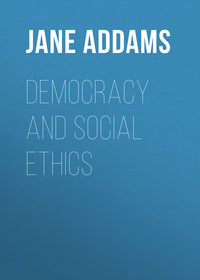 полная версия
полная версияA New Conscience and an Ancient Evil
On the other hand, there is no doubt that this new freedom from domestic and community control, with the opportunity for escaping observation which the city affords, is often utilized unworthily by women. The report of the Chicago vice commission tells of numerous girls living in small cities and country towns, who come to Chicago from time to time under arrangements made with the landlady of a seemingly respectable apartment. They remain long enough to earn money for a spring or fall wardrobe and return to their home towns, where their acquaintances are quite without suspicion of the methods they have employed to secure the much-admired costumes brought from the city. Often an unattached country girl, who has come to live in a city, has gradually fallen into a vicious life from sheer lack of social restraint. Such a girl, when living in a smaller community, realized that good behavior was a protective measure and that any suspicion of immorality would quickly ruin her social standing; but when removed from such surveillance, she hopes to be able to pass from her regular life to an irregular one and back again before the fact has been noted, quite as many young men are trying to do.
Perhaps no young woman is more exposed to temptation of this sort than the one who works in an office where she may be the sole woman employed and where the relation to her employer and to her fellow-clerks is almost on a social basis. Many office girls have taken “business courses” in their native towns and have come to the city in search of the large salaries which have no parallels at home. Such a position is not only new to the individual, but it is so recent an outcome of modern business methods, that it has not yet been conventionalized. The girl is without the wholesome social restraint afforded by the companionship of other working-women and her isolation in itself constitutes a danger. An investigation disclosed that a startling number of Chicago girls had found their positions through advertisements and had no means of ascertaining the respectability of their employers. In addition to this, the girls who seek such positions are sometimes vain and pretentious, and will take any sort of office work because it seems to them “more ladylike.” A girl of this sort came to Chicago from the country three years ago at the age of seventeen and secured a position as a stenographer with a large firm of lawyers. She was pretty and attractive, and in her desire to see more of the wonderful city to which she had come, she accepted many invitations to dinners and theatres from a younger member of the firm. The other girls in the office, representing the more capable type of business women, among whom a careful code of conduct is developing, although at present it is often manifested only by the social ostracism of the one of their number who has broken the conventions, protested against her conduct, first to the girl and then to the head of the office. The usual story developed rapidly, the girl lost her position, her brother-in-law, learning the cause, refused her a home and she became absolutely dependent upon the man. As their relations became notorious, he at length was requested to withdraw from the firm. When brought to my knowledge she had already been deserted for a year. The only people she had known during that time were those in the disreputable hotel in which she had been living when her lover disappeared, and it was through their mistaken kindness in making an opportunity for her in the only life with which they were familiar, that she had been drawn into the worst vice of the city.
She was but one of thousands of young women whose undisciplined minds are fatally assailed by the subtleties and sophistries of city life, and who have lost their bearings in the midst of a multitude of new imaginative impressions. It is hard for a girl, thrilled by the mere propinquity of city excitements and eager to share them, to keep to the gray and monotonous path of regular work. Almost every such girl of the hundreds who have come to grief, “begins” by accepting invitations to dinners and places of amusement. She is always impressed with the ease for concealment which the city affords, although at the same time vaguely resentful that it is so indifferent to her individual existence. It is impossible to estimate the amount of clandestine prostitution which the modern city contains, but there is no doubt that the growth of the social evil at the present moment, lies in this direction. Another of its less sinister developments is perhaps a contemporary manifestation of that break, long considered necessary, between established morality and artistic freedom represented by the hetaira in Athens, the gifted actress in Paris, the geisha in Japan. Insofar as such women have been treated as independent human beings and prized for their mental and social charm, even although they are on a commercial basis, it makes for a humanization of this most sordid business. Such open manifestations of prostitution hasten social control, because publicity has ever been the first step toward community understanding and discipline.
Doubtless the attitude toward the victims of commercialized vice will be modified by many reactions upon the public consciousness, through a thousand manifestations of the great democratic movement which is developing all about us. Certainly we are safe in predicting that when the solidarity of human interest is actually realized, it will become unthinkable that one class of human beings should be sacrificed to the supposed needs of another; when the rights of human life have successfully asserted themselves in contrast to the rights of property, it will become impossible to sell the young and heedless into degradation. An age marked by its vigorous protests against slavery and class tyranny, will not continue to ignore the multitudes of women who are held in literal bondage; nor will an age characterized by a new tenderness for the losers in life’s race, always persist in denying forgiveness to the woman who has lost all. A voice which has come across the centuries, filled with pity for her who has “sinned much,” must at last be joined by the forgiving voices of others, to whom it has been revealed that it is hardness of heart which has ever thwarted the divine purposes of religion. A generation which has gone through so many successive revolts against commercial aggression and lawlessness, will at last lead one more revolt on behalf of the young girls who are the victims of the basest and vilest commercialism. As that consciousness of human suffering, which already hangs like a black cloud over thousands of our more sensitive contemporaries, increases in poignancy, it must finally include the women who for so many generations have received neither pity nor consideration; as the sense of justice fast widens to encircle all human relations, it must at length reach the women who have so long been judged without a hearing.
In that vast and checkered undertaking of its own moralization to which the human race is committed, it must constantly free itself from the survivals and savage infections of the primitive life from which it started. Now one and then another of the ancient wrongs and uncouth customs which have been so long familiar as to seem inevitable, rise to the moral consciousness of a passing generation; first for uneasy contemplation and then for gallant correction.
May America bear a valiant part in this international crusade of the compassionate, enlisting under its banner not only those sensitive to the wrongs of others, but those conscious of the destruction of the race itself, who form the standing army of humanity’s self-pity, which is becoming slowly mobilized for a new conquest!




